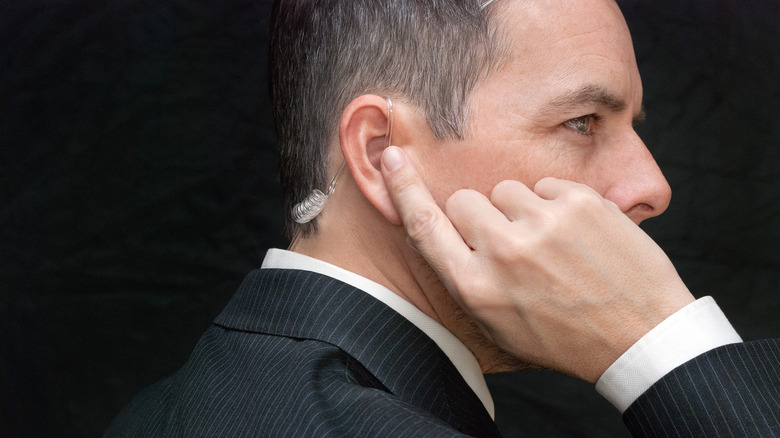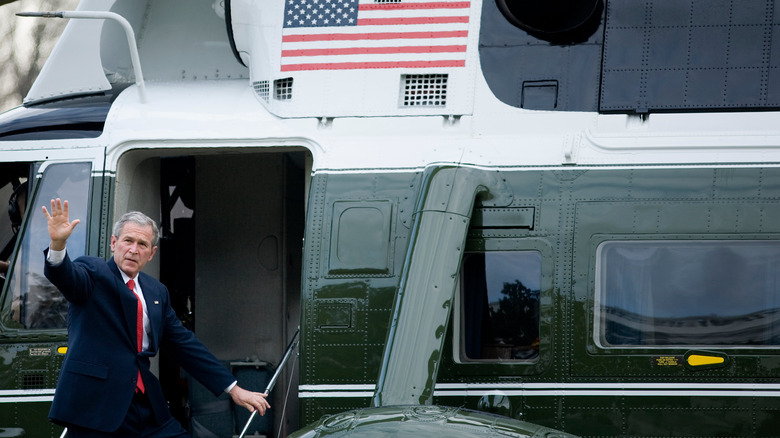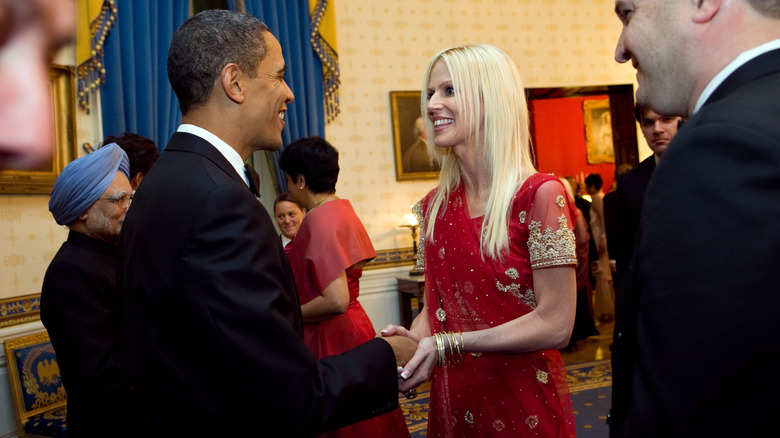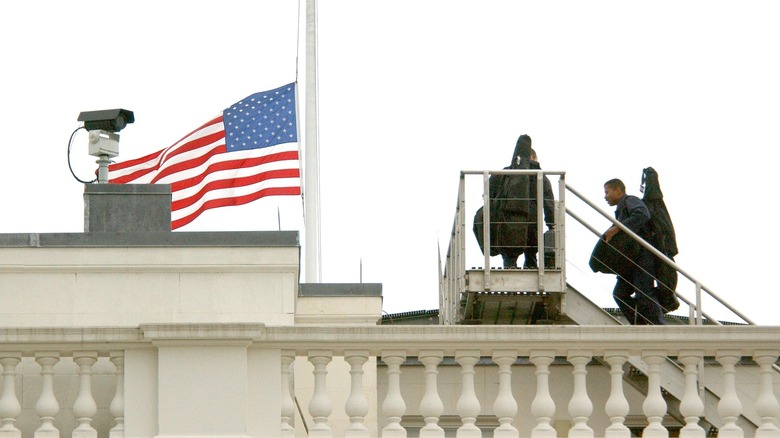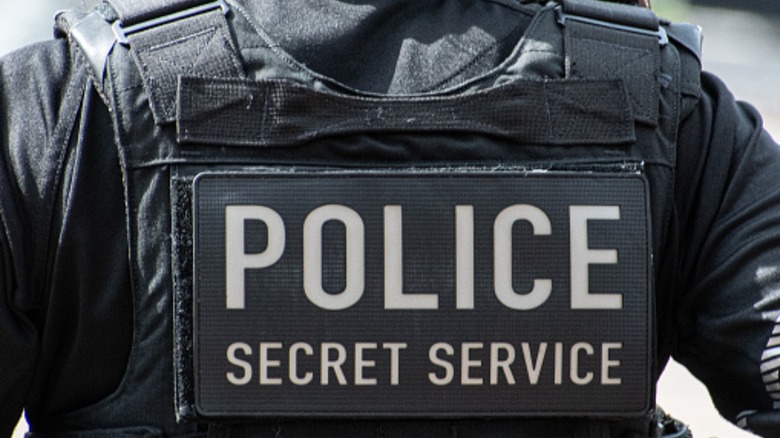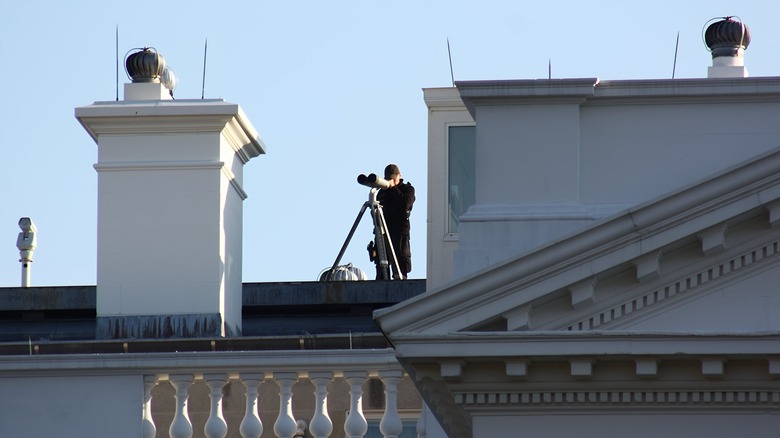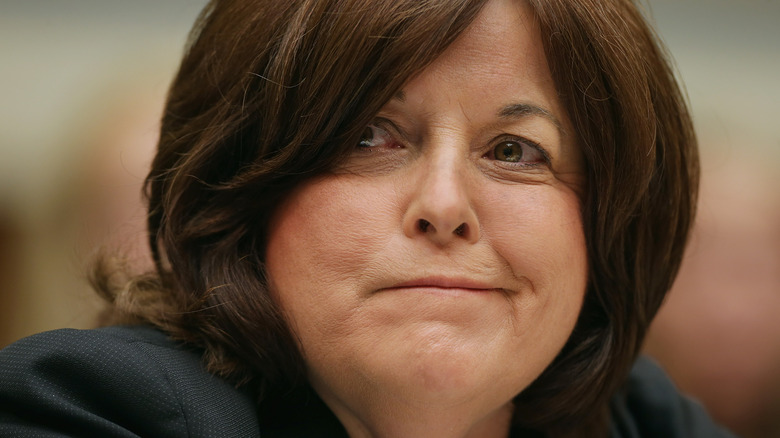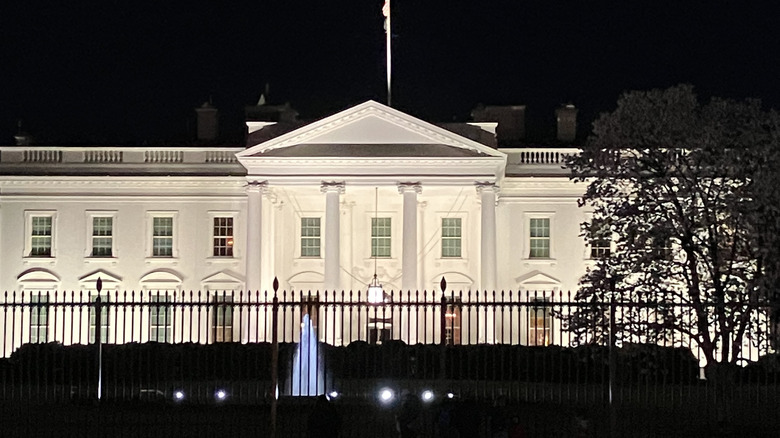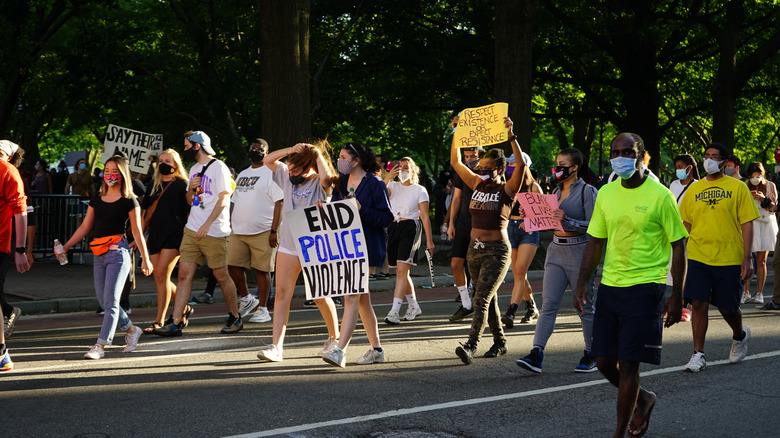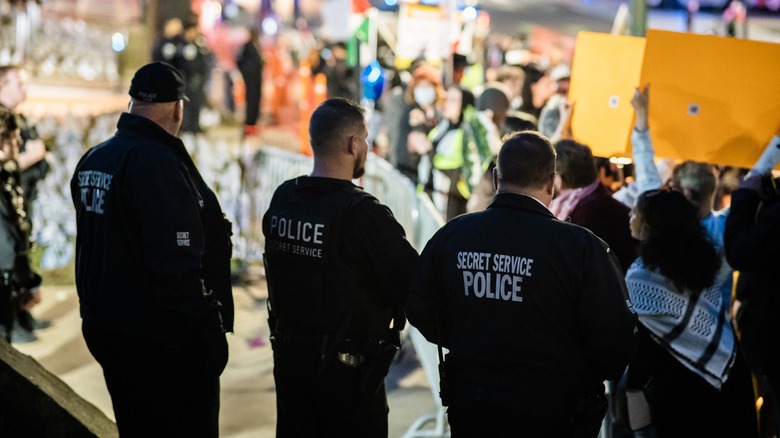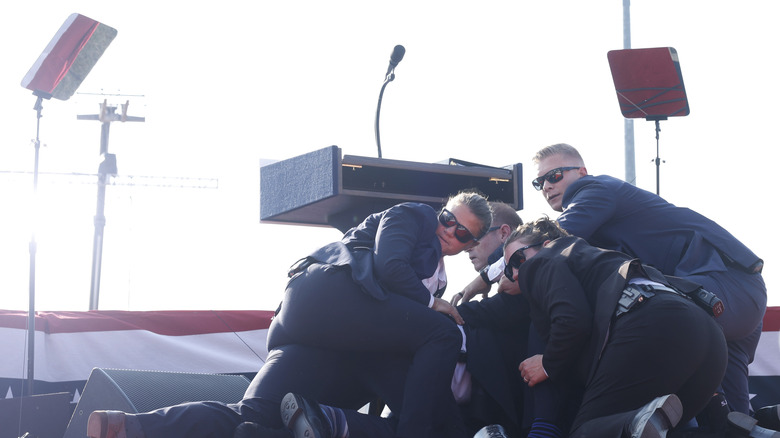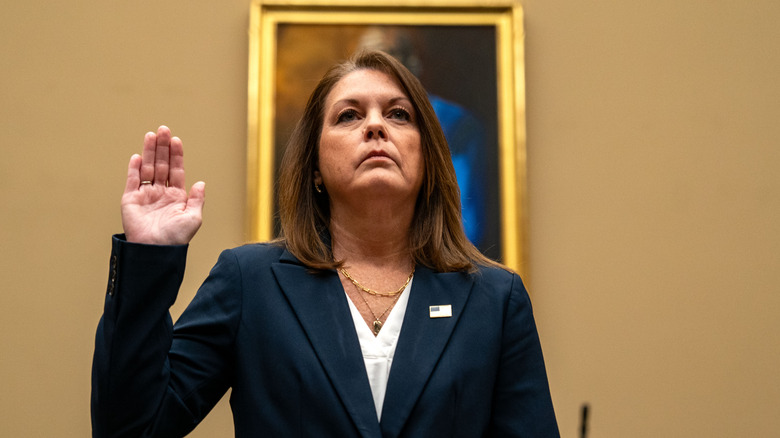The Secret Service's Biggest Scandals Over The Years
The United States Secret Service is the legendary federal law enforcement agency entrusted with protecting the most important public figures in the country. The agency was initially formed in 1865 by the Treasury Department as a group tasked with combating the counterfeiting rings that were doing untold damage to the U.S. economy. After the assassination of President William McKinley in 1901, the agency's responsibilities expanded to include the protection of American presidents. Today, the Secret Service also protects vice presidents and former presidents and fulfills a range of other duties related to security. Its agents are expected to be on top of their game, even if that means following some pretty strange rules.
The Secret Service has captured the public imagination for decades and has been the subject of countless crime novels and Hollywood films, with audiences drawn to the high-stakes risks and potential personal sacrifices that make up the everyday lives of its agents. But the fact is, the Secret Service doesn't always operate with the professionalism expected of it. Here is a selection of the biggest scandals that have plagued the Secret Service in the 21st century alone.
The Bush press plane stowaway
Typically, when U.S. presidents make international tours, they are accompanied by a huge entourage that includes advisors and political aides, Secret Service security staff, and various members of the American press, whose role is to report on the president's actions and provide political analysis. In July 2003, then-President George W. Bush undertook a major five-nation tour of Africa. He was traveling from Pretoria in South Africa to Entebbe in Uganda when a major security breach occurred.
The press for the tour followed Bush's progress in a separate press plane, the passengers of which were meant to have security clearance and be on the official list of travelers. Listed among the passengers were 130 specially selected journalists, as well as White House staffers. However, it was found that the plane had a stowaway: a South African man who had sneaked on board, claiming to be a journalist working with a local youth project. The man was arrested in Uganda after accompanying the official journalists to their hotel, at which point the Secret Service was alerted to his presence. The incident raised major questions for the Secret Service, especially since it took place less than two years after the terror attacks of September 11, 2001, when security on all flights was expected to be at its height.
The White House party crashers
One place you would expect the Secret Service to have a tight grip on security is the White House, the seat of power for the president of the United States and arguably the most important building in the country. The property is used for a great deal of executive work by the president and their administration, but it is also used to host frequent events, during which the Secret Service is charged with ensuring the White House remains secure. Historically, this has not always proven to be the case.
In November 2009, then-President Barack Obama and his wife Michelle were hosting a White House dinner for Indian Prime Minister Manmohan Singh when they ended up with two more guests than they were expecting. Tareq and Michaele Salahi, a couple who were being considered for the reality TV show "The Real Housewives of D.C.," wound up at the dinner and shook hands with the president despite not having an invite or security clearance.
A Secret Service investigation concluded that the Salahis had been waved through the first security checkpoint and that agents had failed to properly vet them at the second, at no point asking their names or checking that they were on the official guest list. Though the White House claimed the Salahis were not invited and painted them as gatecrashers, the couple's lawyer later argued that they believed they were invited and that there had been a mix-up.
A botched response to a White House shooting
Thankfully, Tareq and Michaele Salahi were checked for weapons and found to be unarmed. But sometimes the occupants of the White House find themselves in real danger from would-be attackers, with the Secret Service offering the last line of defense.
On November 11, 2011, a gunman named Oscar Ramiro Ortega-Hernandez pulled up on Constitution Avenue south of the White House and opened fire upon the building with a semi-automatic rifle, prompting an immediate response from Secret Service agents on duty. However, miscommunication caused the Secret Service to botch their response. While agents, including snipers on the White House roof, were surveying the surrounding area for the gunman, an order came through to stand down. Erroneously, their superiors had come to believe that no shots had been fired at all, instead concluding that the sound of gunshots was actually a construction vehicle backfiring. Later, the Secret Service explored the idea that the shots were gang related and not fired at the White House at all. They only recognized there had been an attack when a cleaner found shards of broken glass and cement in the residence four days later.
Ortega-Hernandez was later arrested and sentenced to 25 years in prison. But the incident was a great embarrassment to the Secret Service, as the attacker had managed to flee the scene unimpeded and was only identified after crashing his car and leaving his weapon in the vehicle, which was used as evidence to tie him to the shooting.
The dirty dozen
Some of the biggest scandals connected to the Secret Service aren't related to their effectiveness as agents but rather concern shortcomings in their behavior when off-duty. In 2012, the Service came under heavy scrutiny after it was discovered that 12 members of a security detail present in Colombia had been sent home after being accused of hiring local sex workers during a visit to the country by then-President Barack Obama.
Described by Secret Service expert Ronald Kessler (via The Guardian) as "clearly the biggest scandal in Secret Service history," the incident involved around a dozen agents who went partying in the city of Cartagena and took sex workers back to their hotel. Shockingly, The Washingtonian suggests this may not have been that historically unusual among agents, many of whom were later revealed to have had affairs while on the road.
The agents' nocturnal activities were only uncovered after one sex worker, who later revealed her identity on Colombian television, reported an agent to local police after failing to receive payment for her services. The scandal resulted in a spate of resignations, including those of multiple senior supervisors.
A failed response to fence-jumper
It would be reasonable to expect the perimeter of the White House, the seat of arguably the most powerful office in the world, to be close to impenetrable by everyday people. But shockingly, an incident in 2014 revealed the property to be surprisingly easy to gain entry to, drawing much criticism of the Secret Service, whose raison d'etre is to ensure that the president of the United States is protected at all times.
On September 19, 42-year-old Omar J. Gonzalez managed to gain entry to the White House simply by scaling a fence and running toward the building. Though agents attempted to stop the intruder before he reached it, Gonzalez assaulted one officer and was free to enter the building through an unlocked, unguarded door before being tackled to the ground. Gonzalez was armed with a folding knife and represented a major threat to the security of the president and his family, as well as his staff. Gonzalez was later sentenced to 17 months behind bars and ordered to get psychiatric treatment after his release.
The resignation of Julia Pierson
The year 2014 also saw the resignation of Secret Service Director Julia Pierson, who found her position increasingly untenable after multiple Secret Service gaffes, including the Omar J. Gonzalez incident. Scandals at the time included the revelation that one agent had left a bullet in a woman's hotel room after a night of drinking, that two others had been sent home after getting drunk on a trip to Amsterdam, and that another had sent explicit emails to a junior colleague.
Pierson's duties included an overhaul of the permissive culture of the Secret Service that was bringing the once-respected institution into disrepute. Pierson, who took over the directorship in 2013, had been viewed as a new leader who could refresh the Service. However, she came under fire after stating with regard to the agency: "We need to be more like Disney World. We need to be more friendly, inviting" (via Vanity Fair). Pierson, it turned out, had once worked at Disney World in costume before joining the Secret Service.
After the statement and the continued high frequency of scandals concerning the Secret Service's culture and performance, Pierson's authority soon drained away. Announcing her resignation, she stated: "I think it's in the best interest of the Secret Service and the American public if I step down ... Congress has lost confidence in my ability to run the agency. The media has made it clear that this is what they expected."
Drunk driving at the White House
As has probably become abundantly clear by now, a large number of the scandals that have been attached to the Secret Service in recent years have been the result of the behavior of their agents, emerging from what critics argue is a toxic and often unprofessional working culture. And just a year after the resignation of director Julia Pierson, the Service once again found itself under fire from politicians and the media.
In March 2015, it was reported that, following a party thrown to mark the retirement of spokesman Ed Donovan, two Secret Service agents, who may have been drinking, crashed a car into a barricade at the White House. Both agents were reported as senior figures, and though police at the scene planned to arrest and sobriety-test the pair, a Secret Service supervisor overruled the officers, and the agents were allowed to go home. "Drinking on the job isn't good at McDonald's and it certainly isn't good if you work for the Secret Service," quipped House Oversight Committee Chairman Jason Chaffetz, who learned of the incident after being contacted by whistleblowers (via CNN).
Two months later, a government report stated the pair were "more likely than not" drunk at the time of the incident, per The Guardian. One of the men announced his retirement before the report's findings were published, while the other was placed on administrative leave.
The Black Lives Matter controversy
Black Lives Matter (BLM), a grassroots campaign that emerged in 2013 after the police killing of unarmed Black teenager Trayvon Martin, has been one of the defining social movements of recent years. Protesting anti-Black violence and police brutality, BLM has pushed its messages through online discourse and on-the-ground protests.
In 2020, the campaign was once again compelled to step up its protests after the shocking murder of George Floyd, who died of suffocation after having the knee of Minneapolis police officer Derek Chauvin pressed against his neck for over nine minutes. On June 1 of that year, BLM demonstrators gathered in Lafayette Square near the White House to make their feelings known. In response, U.S. Park Police and the Secret Service took steps to clear the crowds — using what was later found to have been unnecessary violence to do so. BLM responded by filing a legal claim against both bodies.
"We've all seen the video footage from that day — peaceful protesters who were demonstrating their constitutional right to speak out against centuries of systemic racism and racial subjugation were intimidated, attacked, and assaulted by officers of their own federal government," said Rep. Raúl M. Grijalva, chairman of the House Natural Resources Committee. Both the Secret Service and the Park Police agreed to "update and clarify their policies governing demonstrations" after reaching a settlement with BLM, per Roll Call.
The rent-free apartments scheme
The outbreak of the Russia-Ukraine war in February 2022 was followed by one of the most chaotic periods for the Western world since the end of World War II. Millions of refugees from besieged Ukraine fled west to avoid the threat of military violence, while nations including the U.S., the U.K., and E.U. members rallied to combat disinformation and infiltration by potential spies. But amid the mayhem, the Secret Service found itself at the center of yet another scandal.
Barely a month after the outbreak of war, it emerged that four Secret Service members had been placed on leave after becoming embroiled in a scheme involving two men, believed to be operatives from Pakistan or Iran, who were arrested and charged with impersonating agents of the Department of Homeland Security. The men, who had ingratiated themselves into Washington D.C. via friendships with security personnel and neighbors in their luxury apartment building, earned the trust of Secret Service agents with lavish gifts including free stays in luxury apartments. It later emerged that the two men had set up their own "private law enforcement" service and were defrauding the owners of three D.C. apartment complexes. They received prison sentences, while the agents suspected of being involved were placed on leave in another embarrassing episode for the Secret Service.
The attempted assassination of Donald Trump
The 2024 presidential election has been dominated by unexpected twists and turns, including President Joe Biden announcing that he was dropping out of the race and J.D. Vance being chosen as a running mate on the Republican ticket despite his complicated history with the party's standard-bearer. But nothing compares to the truly shocking events of July 13, 2024, when a would-be assassin attempted to murder Republican presidential nominee Donald Trump.
The assassination attempt took place at a Trump rally in Butler, Pennsylvania, in front of thousands of people as Trump was onstage delivering a speech. The shooter, who was later identified as 20-year-old Thomas Matthew Crooks, is believed to have fired eight rounds toward the stage, narrowly missing Trump but hitting three members of the crowd, killing one and critically injuring two.
Crooks was killed by a sniper shortly after he began shooting, but the attack raised serious questions for the Secret Service, which was criticized for not having secured the roof or identified the security threat sooner. It later transpired that Crooks had positioned himself on a warehouse roof less than 500 feet from the stage. Footage emerged of members of the crowd attempting to alert Trump's security detail to the threat before the shots rang out.
Kimberly Cheatle's embarrassing testimony
For the Secret Service, the fallout from the attempted assassination of Republican presidential nominee Donald Trump was immediate. For its director, Kimberly Cheatle, it proved to be career ending.
In the aftermath of the shooting, the House Oversight Committee held a hearing at which Cheatle was called on to offer an explanation of how the Secret Service had failed to properly ensure the safety of Trump and his supporters. During the hearing, Rep. Pat Fallon asked: "Director Cheatle, on your leadership, your agency got outsmarted and outmaneuvered by a 20-year-old. How can we have any confidence that you could stop trained professionals from a nefarious nation state?" to which Cheatle limply responded: "Those are absolutely questions that we need to have answered" (via USA Today). Many on the committee called for Cheatle's resignation, which she refused. She was also accused of leaking her opening statement to the press prior to the hearing, which she denied. "You're full of s*** today," said a visibly angry Rep. Nancy Mace (via CBC). Just 10 days after the assassination attempt, which was described as one of the worst security breaches in the history of the Secret Service, Cheatle finally announced her resignation.
